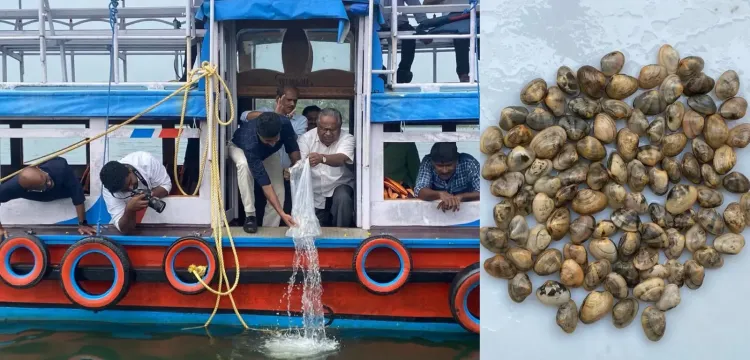CMFRI Introduces Three Million Short Neck Clam Seeds to Kerala Lake for Stock Recovery

Kochi, Dec 17 (NationPress) In an effort to tackle the alarming decrease in the short neck clam population, the ICAR-Central Marine Fisheries Research Institute (CMFRI) has undertaken a stock enhancement initiative by introducing three lakh short clam seeds into Ashtamudi Lake in Kollam district, Kerala, on Tuesday as part of the Pradhan Mantri Matsya Smpada Yojana (PMMSY) Blue Growth Project.
Recent estimates from CMFRI indicate that annual catches have plummeted to below 1,000 tons, a stark contrast to the 10,000 tons recorded in the early 1990s.
This particular clam species boasts significant export potential due to the rising international demand for clams, thus presenting substantial economic opportunities for local communities.
The seeds, cultivated in the hatchery at the Vizhinjam Regional Centre of CMFRI, were released into Ashtamudi Lake, where this species has been reported to be severely depleted.
The ranching initiative represents a sustainable approach to replenish clam stocks, ensuring the continuity of this vital resource within the backwaters. The goal is to restore clam populations, guarantee sustainability, support local fishermen, and enhance export revenues.
Thanks to a year of research, the CMFRI has successfully developed captive breeding technology for this clam species, which has made the seed production for release possible.
M.K. Anil, Principal Scientist at CMFRI's Vizhinjam Regional Centre, emphasized that the short neck clam is a valuable resource in Ashtamudi Lake with considerable economic and ecological significance.
“However, the clam fishery has experienced a dramatic decline in recent years, jeopardizing the livelihoods of thousands of fishermen who depend on this resource,” he stated.
CMFRI scientists have indicated that major factors such as environmental pollution, the invasion of non-native species like the Charru mussel, and the effects of climate change—including changes in salinity and water temperature—have severely impacted the clam population.
The event also marked the launch of hatchery facilities dedicated to producing bivalves aimed at enhancing sustainable aquaculture practices and meeting the increasing demand for high-quality seeds. Mussel seeds were distributed to local farmers, equipping them with the necessary resources to bolster their aquaculture efforts and improve their livelihoods.






